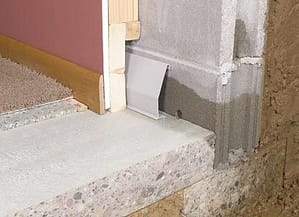10 Easy Facts About Best Basement Waterproofing Explained
10 Easy Facts About Best Basement Waterproofing Explained
Blog Article
Some Known Incorrect Statements About Best Basement Waterproofing
Table of ContentsA Biased View of Best Basement WaterproofingAll About Best Basement WaterproofingSee This Report about Best Basement WaterproofingIndicators on Best Basement Waterproofing You Should KnowBest Basement Waterproofing Can Be Fun For Anyone
AdvantaClean's trained specialists and professionals will locate the water resource. If wall or piece fractures are present, we will certainly infuse polyurethane and epoxies into the cracks and seal the compromise, protecting against more moisture from going into.Correct grading around the home to guide dampness far from the framework. Putting up, repairing, or cleaning gutters and downspouts. Interior or exterior waterproofing with filler, sealer, and/or waterproof paint. Installing basement ventilation systems, conditioning systems, or cellar dehumidifier systems to obtain water out of your cellar. Picking AdvantaClean's cellar waterproofing solutions is a reliable means to treat moisture and protect against mold and mildew from endangering the structure of your home and the health of your household.
If there's condensation on the exterior of the foil, you have high humidity in your basement. If the aluminum foil has condensation on the within surface area (next to the wall), the soil around your residence may be naturally damp from a high water table or bad soil drainage.
You can waterproof simply your interior wall surfaces, which may solve the trouble. Once they dry, they stick completely to concrete and masonry walls.
What Does Best Basement Waterproofing Mean?
Swirl the brush at the last of application to offer the wall surface an appealing, finished look. Concrete water resistant coatings can not be used to previously painted surface areas; examine the tag. A 5-gallon pail expenses regarding $60. Understood as densifiers, they are ideal just for wall surfaces that have not been painted or sealed.
But you comb, roll, or spray it on far more thickly one gallon covers simply 75 square feet, not the 300 square feet typical with standard paint. Water-proof paint is fine for do it yourself application. You can apply it over painted surfaces, and paint over it once it's cured (one gallon prices $37).
It can set you back $10,000 to $15,000, depending on the work needed (Best Basement Waterproofing). Exterior waterproofing entails excavating all around the house to the complete deepness of the structure walls, after that installing a water-proof finishing or membrane topped by water drainage panels.
The 9-Minute Rule for Best Basement Waterproofing
We've all been caught in a tornado without umbrella or raincoat. And it's constantly a recipe for disaster: everything's wet, your hairstyle is ruined, and points are getting mildewy. A basement without waterproofing is sort of like that. Minus the wrecked coiffure part. Your basement doesn't want to go through a downpour without appropriate protection just as long as you don't intend to.
Exterior waterproofing is a waterproofing method that involves sealing your home from the outside. The foundation walls are home then cleaned, sealed, and covered with a water-proof membrane layer or sealer.

Best Basement Waterproofing Things To Know Before You Buy
It's a much more involved process that calls for digging up your lawn, which is pricey and taxing. Exterior waterproofing involves eliminating every little thing surrounding the home, consisting of decks, driveways, pathways, landscaping, AC devices, decks, and so forth. If any of the job was done improperly and water is still entering your cellar, there isn't much you can do to remedy or fix it.
Inside basement waterproofing entails waterproofing from the within. Any type of water that leaks right into your basement is redirected prior to it touches your flooring.
It's an effective technique to water resistant your basement. The disadvantage of interior basement waterproofing primarily pertains to the installation process. This approach calls for stored products, furnishings, and built-in shelving or closets to be moved from touching the basement walls. And throughout setup, your cellar can not be made use of. The biggest difference between the 2 approaches is this: Exterior Discover More Here waterproofing is a preventative remedy and interior waterproofing is a restorative solution.
The Only Guide for Best Basement Waterproofing
To conclude, outside and indoor cellar waterproofing are both reliable techniques of securing your home from water damage. Outside waterproofing produces a barrier that protects against water from entering your home, while indoor waterproofing reroutes water that does enter your home. And it is very important to note that exterior waterproofing is an expensive and disruptive setup procedure when compared to interior waterproofing.
Whichever method you choose, see to it you choose a trusted and reliable contractor for the work. Both approaches require skilled employees to manage the task. If you have any inquiries regarding basement waterproofing, please connect to us. And if you remain in our service location and have water in your basement, call us for a cost-free, no-obligation home assessment.
You can submit our form right here. Best Basement Waterproofing, start a chat check in the bottom right-hand corner, or call us at 1-800-827-0702
Report this page